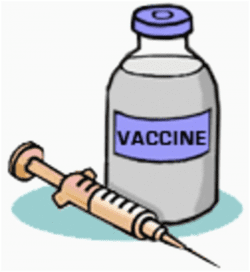The monthly “Did you know…” information provided by the Health and Wellness Ministry
You have the power to protect against vaccine preventable diseases. Maternal, childhood and adult vaccinations are all available. Adults with chronic conditions like diabetes or heart diseases are at greater risk for severe complications from certain vaccine -preventable diseases. Chickenpox, measles, polio, smallpox and meningitis are a few of the vaccine-preventable diseases.
Why child need vaccinations?
According to the CDC, on-time vaccination throughout childhood is  essential because it helps provide immunity before children are exposed to potentially life-threatening diseases. Vaccines are tested to ensure that they are safe and effective for children to receive at the recommended ages. Immunity is the body’s way of preventing disease. When your baby is born, his/her immune system is not fully developed, which can put him/her at greater risk for infections. Vaccines reduce your child’s risk of infection by working with his/her body’s natural defenses to help safely develop immunity to disease. If you have questions or concerns about vaccinations, talk to your child’s physician
essential because it helps provide immunity before children are exposed to potentially life-threatening diseases. Vaccines are tested to ensure that they are safe and effective for children to receive at the recommended ages. Immunity is the body’s way of preventing disease. When your baby is born, his/her immune system is not fully developed, which can put him/her at greater risk for infections. Vaccines reduce your child’s risk of infection by working with his/her body’s natural defenses to help safely develop immunity to disease. If you have questions or concerns about vaccinations, talk to your child’s physician
Why adults need vaccinations too.
You may not realize you need vaccines throughout your adult life to protect yourself and those around you. All adults should get a Flu vaccine every year to protect against seasonal flu. The Td/Tdap to protect against tetanus, diphtheria, and pertussis (whopping cough). Each year thousands of adults in the United States get sick from diseases that could be prevented by vaccines — some people are hospitalized, and some even die.
Even if you got all your vaccines as a child, the protection from some vaccines can wear off over time. You may need additional vaccines such as: chickenpox, Hepatitis A, Hepatitis B, Human Papillomavirus (HPV), Measles, Mumps and Rubella (MMR), Meningococcal, Pneumococcal and Shingles. You can get vaccines at doctors’ offices, pharmacies, workplaces, community health clinics, health departments, and other locations.
To find a vaccine provider near you, go to http://vaccine.healthmap.org. Most health insurance plans cover the cost of recommended vaccines. Check with your insurance provider for details and for a list of vaccine providers. If you do not have health insurance, visit www.healthcare.gov to learn more about health coverage options.
For more information go to: www.cdc.gov/vaccines and https://www.cdc.gov/vaccines/hcp/adults


